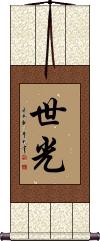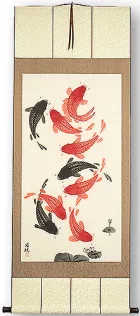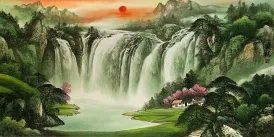Many custom options...
And formats...

Not what you want?
Try other similar-meaning words, fewer words, or just one word.
Light of the World in Chinese / Japanese...
Buy a Light of the World calligraphy wall scroll here!
Personalize your custom “Light of the World” project by clicking the button next to your favorite “Light of the World” title below...
Light of the World
The Geisha’s World
花柳界 literally means “Flower Willow World/Kingdom.”
In Japanese, this means “The Realm of the Geisha” or “World of the Geisha.” I suppose there is a presumption that the Geisha is surrounded by flowers in their residence. In Chinese and Korean, this pretty much has colloquially come to mean “The Red Light District” or to refer to pimps, prostitutes, and johns as a group.
Bright and Promising Future
明るい未来 is a Japanese proverb that means “Bright Future.”
It suggests a lot of possibilities and potential awaits in your future. A great gift for a graduate.
The first part of this proverb literally means bright or light. The second part means the future but can also be translated as “the world to come.”
Note: Because this selection contains some special Japanese Hiragana characters, it should be written by a Japanese calligrapher.
This in-stock artwork might be what you are looking for, and ships right away...
Gallery Price: $126.00
Your Price: $69.88
Gallery Price: $220.00
Your Price: $138.88
Gallery Price: $120.00
Your Price: $79.88
Gallery Price: $72.00
Your Price: $39.95
Gallery Price: $400.00
Your Price: $138.88
Not the results for light of the world that you were looking for?
Below are some entries from our dictionary that may match your light of the world search...
| Characters If shown, 2nd row is Simp. Chinese |
Pronunciation Romanization |
Simple Dictionary Definition |
世光 see styles |
shì guāng shi4 guang1 shih kuang toshimitsu としみつ |
More info & calligraphy: Light of the Worldlight of the world |
花柳界 see styles |
karyuukai / karyukai かりゅうかい |
More info & calligraphy: The Geisha’s World |
二光 see styles |
èr guāng er4 guang1 erh kuang nikō |
The dual lights, i.e. 色光 the halo from a Buddha's body and 心光 the light from his mind. Also 常光 the constant halo from the bodies of Buddhas and 神通光 the supernatural light sent out by a Buddha (e.g. from between his eyebrows) to illuminate a distant world. |
四土 see styles |
sì tǔ si4 tu3 ssu t`u ssu tu shido しど |
{Buddh} four realms (in Tendai Buddhism or Yogacara) The four Buddha-kṣetra, or realms, of Tiantai: (1) 凡聖居同土 Realms where all classes dwell— men, devas, Buddhas, disciples, non-disciples; it has two divisions, the impure, e. g. this world, and the pure, e. g. the 'Western' pure-land. (2) 方便有餘土 Temporary realms, where the occupants have got rid of the evils of 見思 unenlightened views and thoughts, but still have to be reborn. (3) 實報無障礙土 Realms of permanent reward and freedom, for those who have attained bodhisattva rank. (4) 常寂光土 Realm of eternal rest and light (i. e. wisdom) and of eternal spirit (dharmakāya), the abode of Buddhas; but in reality all the others are included in this, and are only separated for convenience, sake. |
四禪 四禅 see styles |
sì chán si4 chan2 ssu ch`an ssu chan shizen |
(四禪天) The four dhyāna heavens, 四靜慮 (四靜慮天), i. e. the division of the eighteen brahmalokas into four dhyānas: the disciple attains to one of these heavens according to the dhyāna he observes: (1) 初禪天 The first region, 'as large as one whole universe' comprises the three heavens, Brahma-pāriṣadya, Brahma-purohita, and Mahābrahma, 梵輔, 梵衆, and 大梵天; the inhabitants are without gustatory or olfactory organs, not needing food, but possess the other four of the six organs. (2) 二禪天 The second region, equal to 'a small chiliocosmos' 小千界, comprises the three heavens, according to Eitel, 'Parīttābha, Apramāṇābha, and Ābhāsvara, ' i. e. 少光 minor light, 無量光 infinite light, and 極光淨 utmost light purity; the inhabitants have ceased to require the five physical organs, possessing only the organ of mind. (3) 三禪天 The third region, equal to 'a middling chiliocosmos '中千界, comprises three heavens; Eitel gives them as Parīttaśubha, Apramāṇaśubha, and Śubhakṛtsna, i. e. 少淨 minor purity, 無量淨 infinite purity, and 徧淨 universal purity; the inhabitants still have the organ of mind and are receptive of great joy. (4) 四禪天 The fourth region, equal to a great chiliocosmos, 大千界, comprises the remaining nine brahmalokas, namely, Puṇyaprasava, Anabhraka, Bṛhatphala, Asañjñisattva, Avṛha, Atapa, Sudṛśa, Sudarśana, and Akaniṣṭha (Eitel). The Chinese titles are 福生 felicitous birth, 無雲 cloudless, 廣果 large fruitage, 無煩 no vexations, atapa is 無熱 no heat, sudṛśa is 善見 beautiful to see, sudarśana is 善現 beautiful appearing, two others are 色究竟 the end of form, and 無想天 the heaven above thought, but it is difficult to trace avṛha and akaniṣṭha; the inhabitants of this fourth region still have mind. The number of the dhyāna heavens differs; the Sarvāstivādins say 16, the 經 or Sutra school 17, and the Sthavirāḥ school 18. Eitel points out that the first dhyāna has one world with one moon, one mem, four continents, and six devalokas; the second dhyāna has 1, 000 times the worlds of the first; the third has 1, 000 times the worlds of the second; the fourth dhyāna has 1, 000 times those of the third. Within a kalpa of destruction 壞劫 the first is destroyed fifty-six times by fire, the second seven by water, the third once by wind, the fourth 'corresponding to a state of absolute indifference' remains 'untouched' by all the other evolutions; when 'fate (天命) comes to an end then the fourth dhyāna may come to an end too, but not sooner'. |
娑婆 see styles |
suō pó suo1 po2 so p`o so po shaba; shaba しゃば; シャバ |
(1) this world; this life; (2) (kana only) (colloquialism) the free world (outside of prison, the army, red light district, etc.); (3) {Buddh} this corrupt world; present world sahā; that which bears, the earth, v. 地; intp. as bearing, enduring; the place of good and evil; a universe, or great chiliocosm, Where all are subject to transmigration and which a Buddha transforms; it is divided into three regions 三界 and Mahābrahmā Sahāmpati is its lord. Other forms: 娑婆世界; 娑界; 娑媻; 娑訶; 沙訶; 索訶. |
幽冥 see styles |
yōu míng you1 ming2 yu ming yū mei ゆうめい |
dark; hell; netherworld; hades semidarkness; deep and strange; hades; the present and the other world; dark and light darkness |
幽明 see styles |
yōu míng you1 ming2 yu ming yuumei / yume ゆうめい |
the hidden and the visible; that which can be seen and that which cannot; darkness and light; night and day; wisdom and ignorance; evil and good; the living and the dead; men and ghosts semidarkness; deep and strange; hades; the present and the other world; dark and light; (given name) Yūmei darkness and light |
世光明 see styles |
shì guāng míng shi4 guang1 ming2 shih kuang ming sekōmyō |
light of the world |
世光曜 see styles |
shì guāng yào shi4 guang1 yao4 shih kuang yao sekōyō |
brilliant light of the world |
八變化 八变化 see styles |
bā biàn huà ba1 bian4 hua4 pa pien hua hachi henge |
Eight supernatural powers of transformation, characteristics of every Buddha: (1) to shrink self or others, or the world and all things to an atom; (2) to enlarge ditto to fill all space; (3) to make the same light as a feather; (4) to make the same any size or anywhere at will; (5) everywhere and in everything to be omnipotent; (6) to be anywhere at will, either by self-transportation, or bringing the destination to himself, etc; (7) to shake all things (in the six, or eighteen ways); (8) to be one or many and at will pass through the solid or through space, or through fire or water, or transform the four elements at will, e.g. turn earth into water. Also 八神變; 八自在. |
天台宗 see styles |
tiān tái zōng tian1 tai2 zong1 t`ien t`ai tsung tien tai tsung tendaishuu / tendaishu てんだいしゅう |
Tiantai school of Buddhism Tendai sect (of Buddhism); (personal name) Tendaishuu The Tiantai, or Tendai, sect founded by 智顗 Zhiyi. It bases its tenets on the Lotus Sutra 法華經 with the 智度論, 涅盤經, and 大品經; it maintains the identity of the Absolute and the world of phenomena, and attempts to unlock the secrets of all phenomena by means of meditation. It flourished during the Tang dynasty. Under the Sung, when the school was decadent, arose 四明 Ciming, under whom there came the division of 山家 Hill or Tiantai School and 山外 the School outside, the latter following 悟恩 Wuen and in time dying out; the former, a more profound school, adhered to Ciming; it was from this school that the Tiantai doctrine spread to Japan. The three principal works of the Tiantai founder are called 天台三部, i. e. 玄義 exposition of the deeper meaning of the Lotus; 文句 exposition of its text; and 止觀 meditation; the last was directive and practical; it was in the line of Bodhidharma, stressing the 'inner light'. |
極光淨天 极光淨天 see styles |
jí guāng jìng tiān ji2 guang1 jing4 tian1 chi kuang ching t`ien chi kuang ching tien Gokukōjō ten |
Pure heaven of utmost light, the highest of the second dhyāna heavens of the form world; the first to be re-formed after a universal destruction and in it Brahma and devas come into existence; also極光音天 Ābhāsvara. |
Variations: |
yuumei / yume ゆうめい |
semidarkness; deep and strange; hades; the present and the other world; dark and light |
日の目を見る see styles |
hinomeomiru ひのめをみる |
(exp,v1) to see the light of day; to be revealed (to the world); to be realized |
Variations: |
hinomeomiru ひのめをみる |
(exp,v1) to see the light of day; to be revealed (to the world); to be realized |
Variations: |
ukiyo; fusei(浮世) / ukiyo; fuse(浮世) うきよ; ふせい(浮世) |
(1) fleeting life; this transient world; floating world; (2) (esp. 憂き世) sad world; world of grief and worry; (3) the world of the living; this life; this world; the present world; (4) (the world of the) red light districts |
Variations: |
hinomeoabiru ひのめをあびる |
(exp,v1) (See 日の目を見る) to see the light of day; to be revealed (to the world); to be realized |
Variations: |
hakujitsunomotonisarasu はくじつのもとにさらす |
(exp,v5s) (idiom) to bring to light; to expose (to the world) |
Variations: |
ukiyo; fusei(浮世) / ukiyo; fuse(浮世) うきよ; ふせい(浮世) |
(1) fleeting life; this transient world; floating world; (2) (esp. 憂き世) sad world; world of grief and worry; (3) the world of the living; this life; this world; the present world; (4) (the world of the) red light districts |
The following table may be helpful for those studying Chinese or Japanese...
| Title | Characters | Romaji (Romanized Japanese) | Various forms of Romanized Chinese | |
| Light of the World | 世光 | toshimitsu | shì guāng shi4 guang1 shi guang shiguang | shih kuang shihkuang |
| The Geisha’s World | 花柳界 | karyuukai / karyukai | huā liǔ jiè hua1 liu3 jie4 hua liu jie hualiujie | hua liu chieh hualiuchieh |
| Bright and Promising Future | 明るい未来 | akarui mirai akaruimirai | ||
Successful Chinese Character and Japanese Kanji calligraphy searches within the last few hours...















